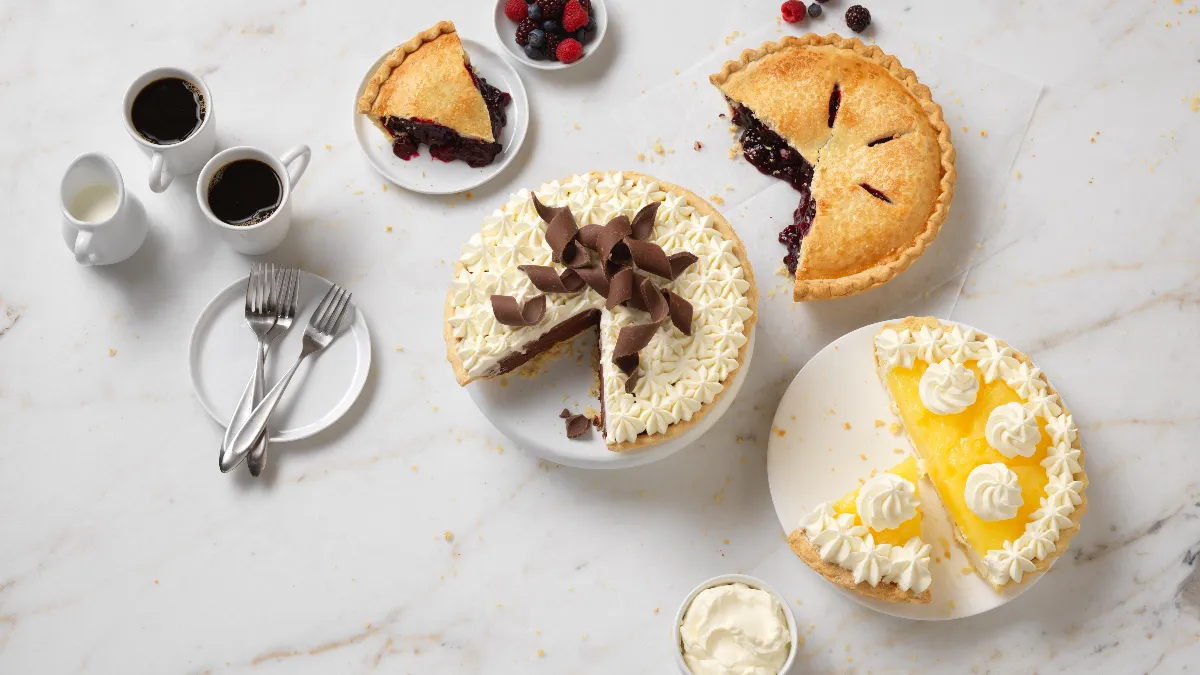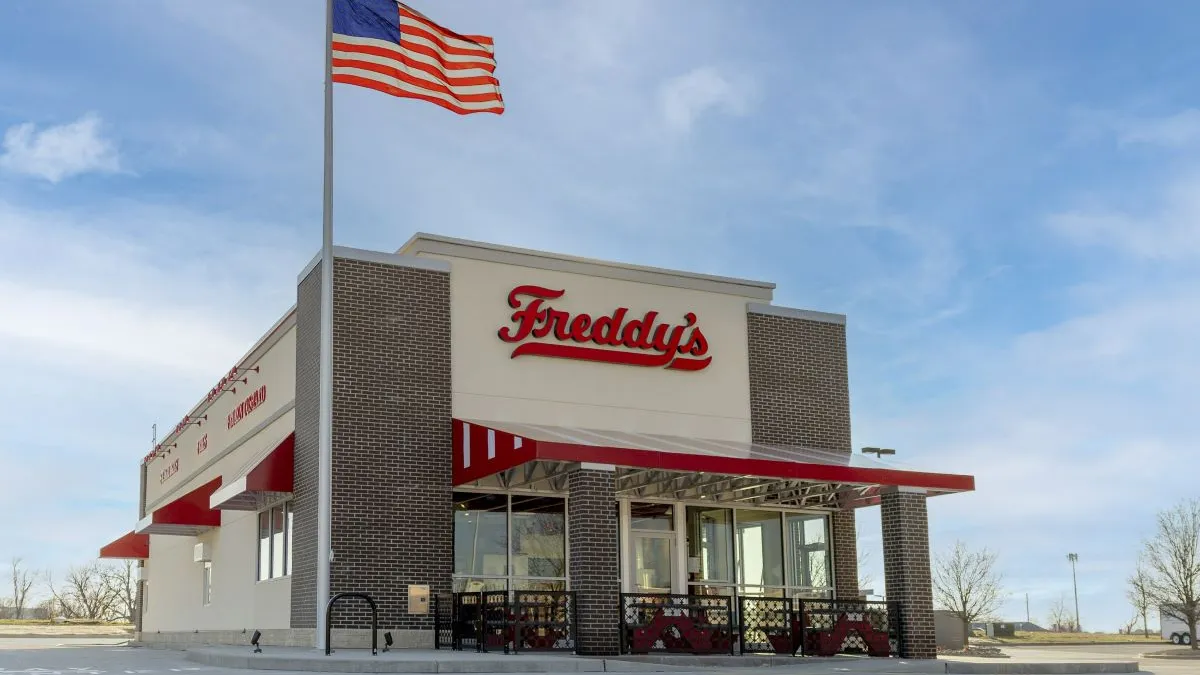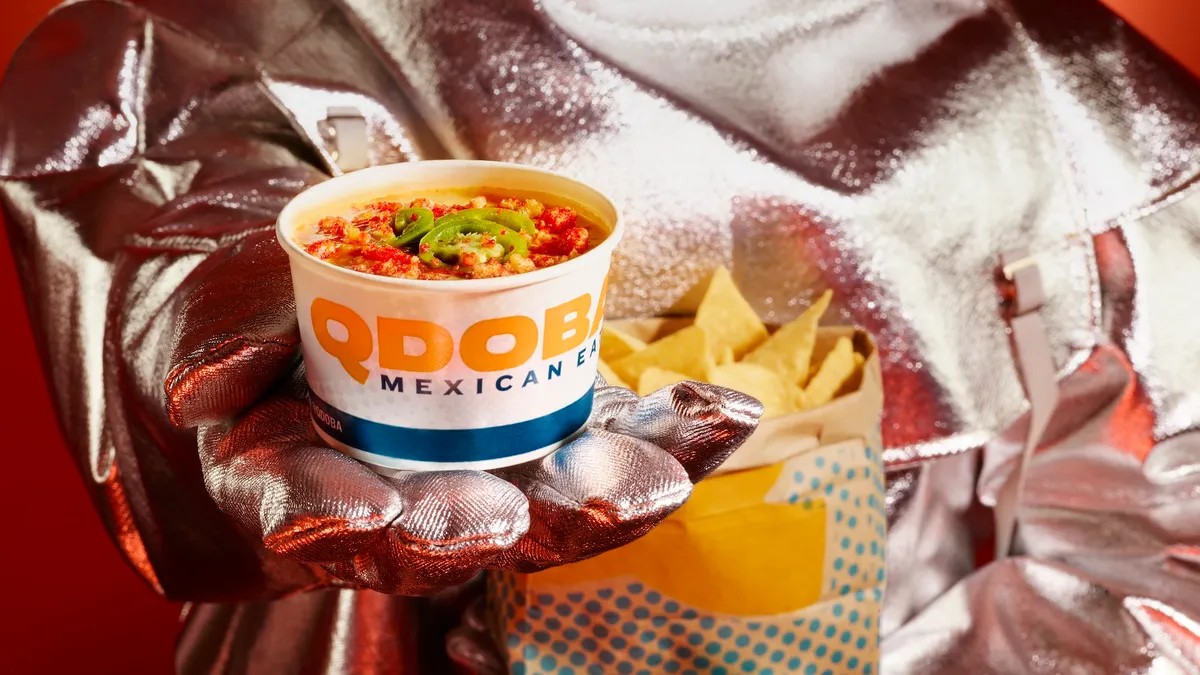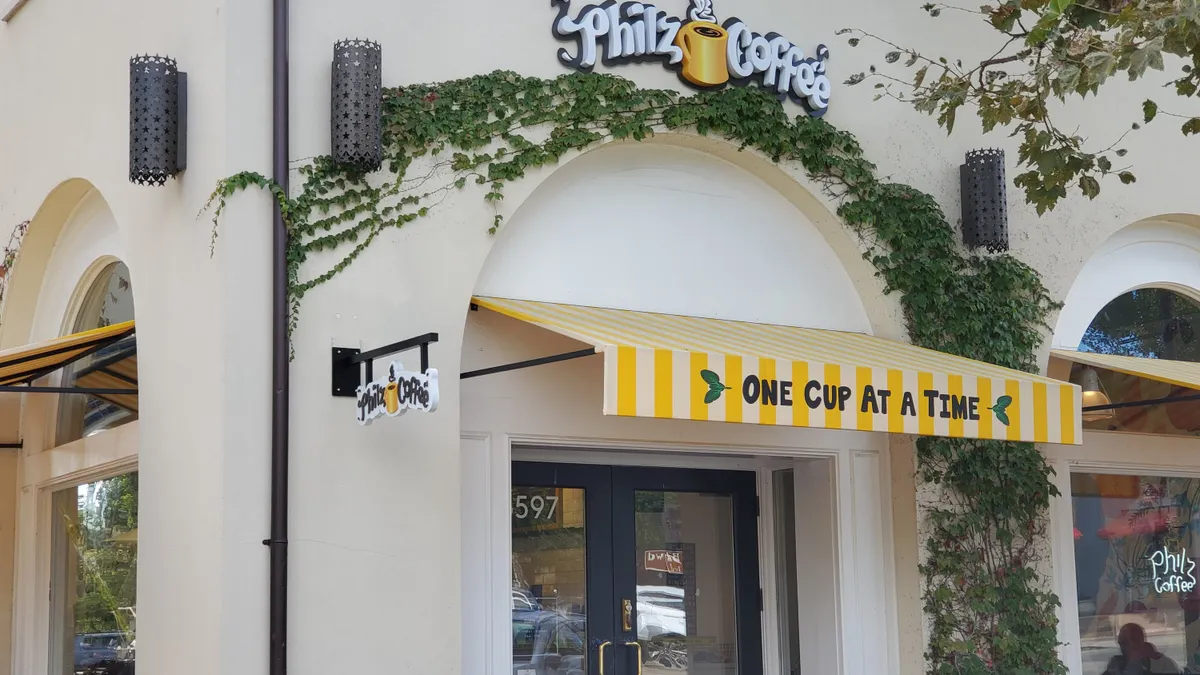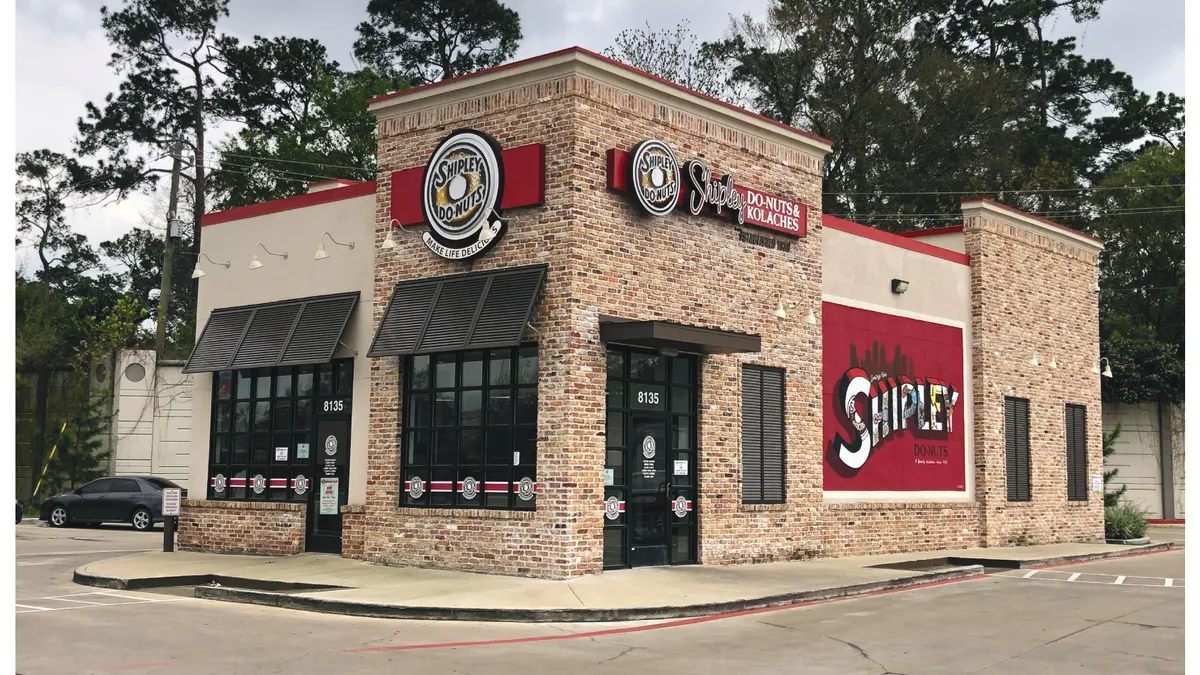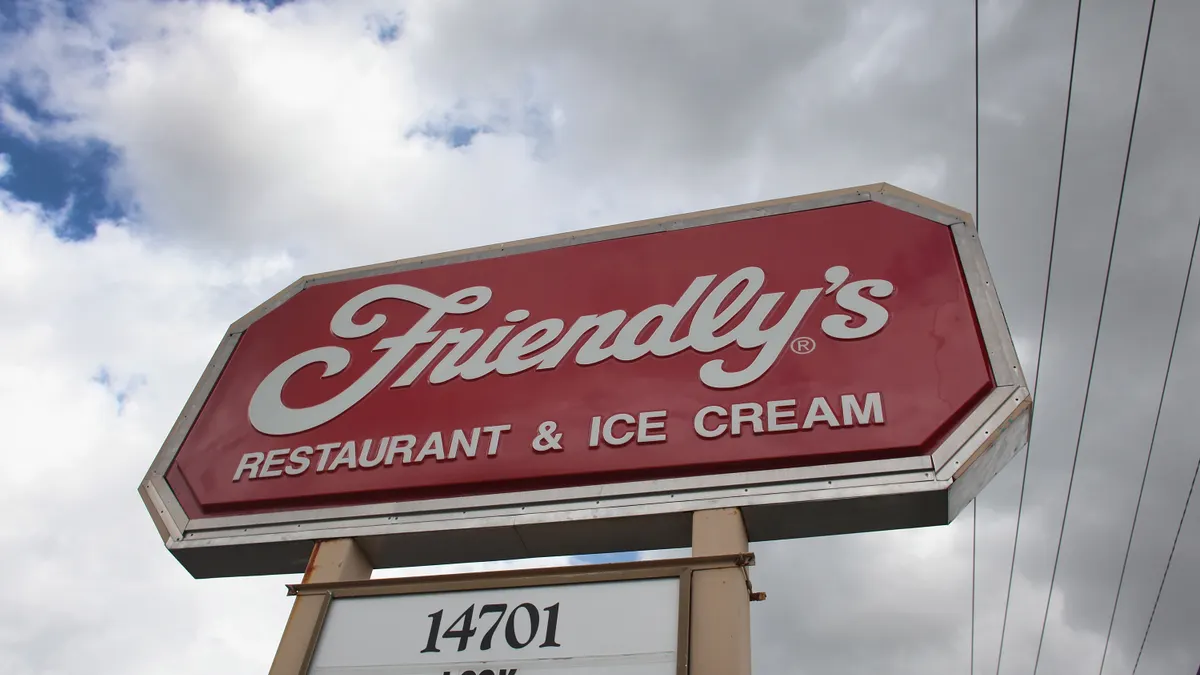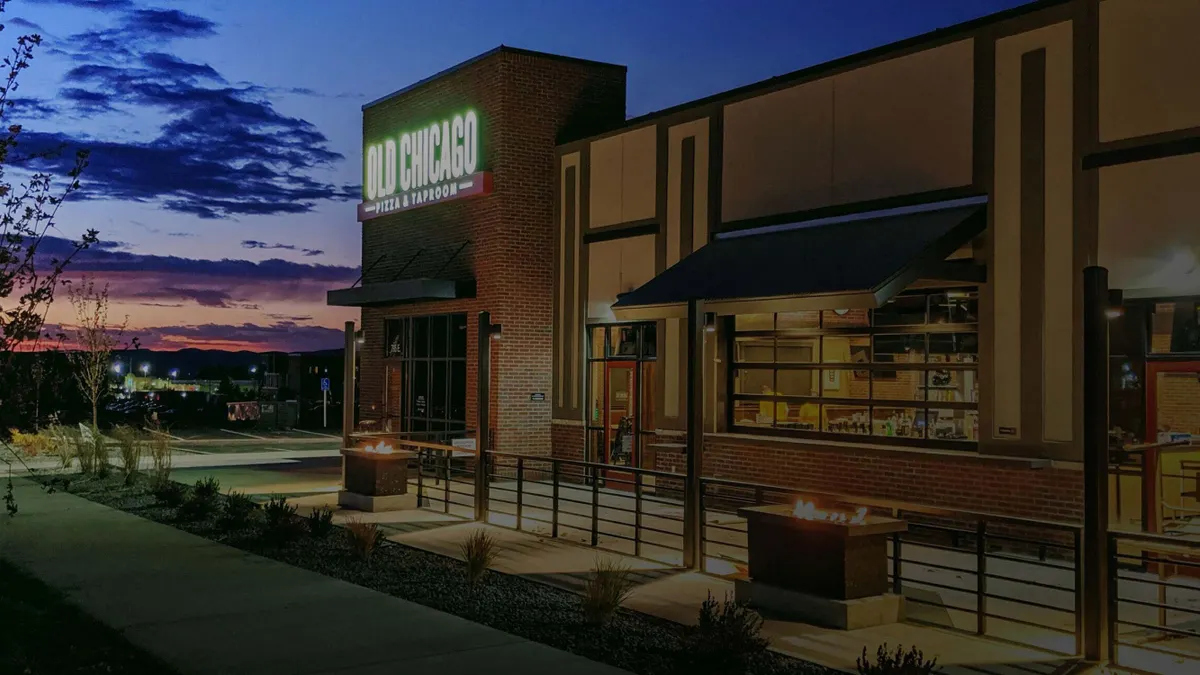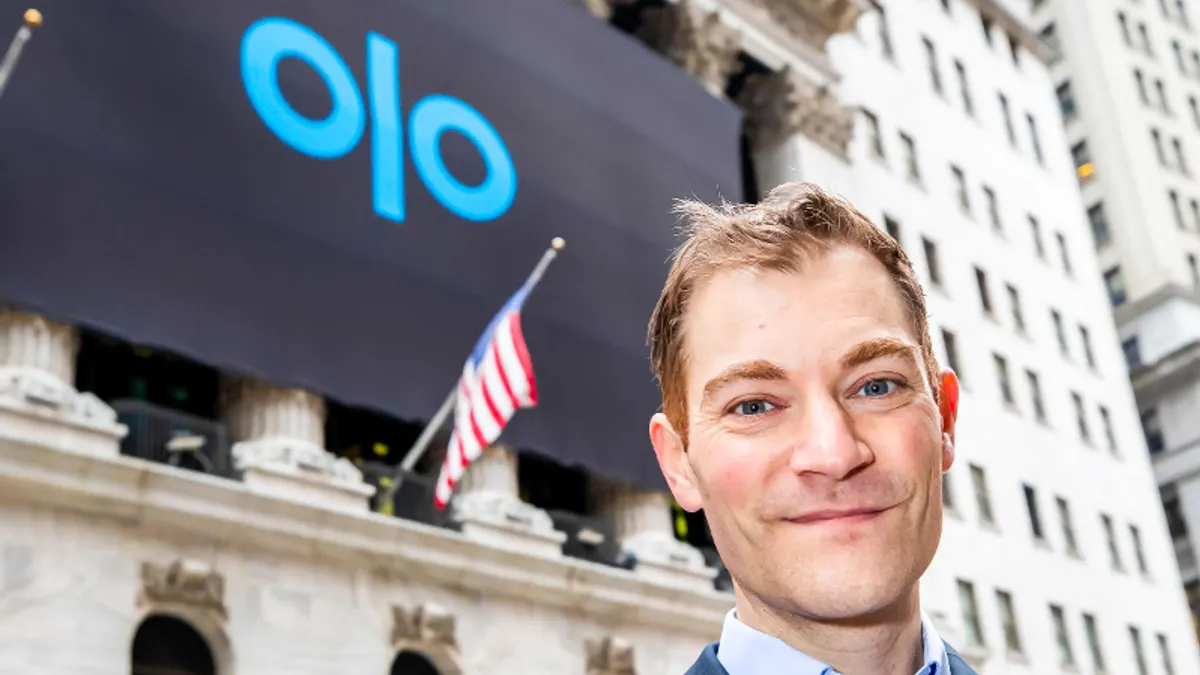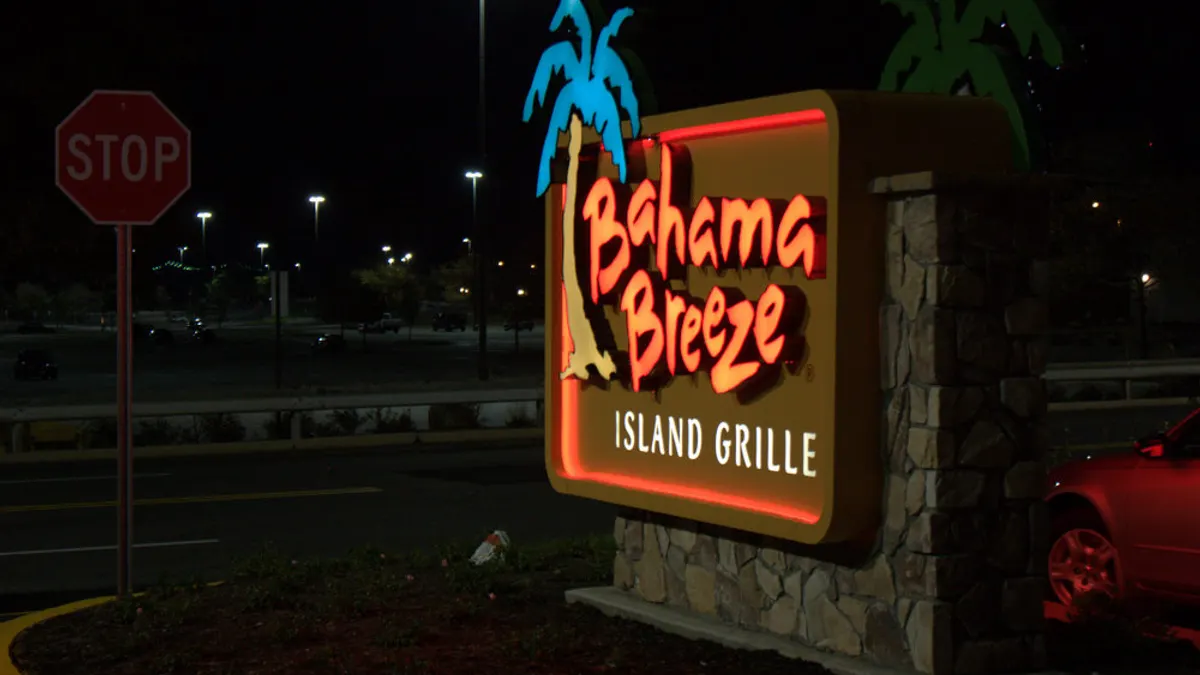After Famous Dave's sales declined 10% in 2018 and nearly 7% in 2019, CEO Jeff Crivello thought it was time to partner with an outside brand to boost sales. He pitched a few concepts to the corporate board, including Bakers Square.
"One of the ideas I had was that nothing goes better with barbecue than apple pie and peach pie in the summer," Crivello said, adding that he grew up with the Bakers Square pies and claims they are the best in the country.
But two years ago when he first called Bakers Square, the company said the timing wasn't right for a partnership, and it wasn't last year either. In 2021, however, the companies finally worked out a deal.
While Crivello was mainly focused on Bakers Square, owner VIBSQ, LLC said it was willing to sell its Village Inn brand, a family-oriented breakfast restaurant. Crivello and his team saw that it was a very similar concept to Famous Dave's in terms of size — it has about 100 franchise units and 20 corporate units — and a wide footprint across the country. Village Inn is also pie-centric, offering a pie special every Wednesday, for example, so it made sense to buy both brands, Crivello said. In the end, BBQ Holdings will pay $13.5 million to buy Village Inn and Bakers Square, in a transaction that is expected to close at the end of July.
BBQ Holdings' latest deal is just one of several acquisitions that have taken place this summer. Between June 24 and July 2, six deals were announced. Among those was the biggest of the year currently — Fat Brand's $442.5 million buy of multi-brand company Global Franchise Group.
Restaurant mergers and acquisitions
So far this year, Restaurant Dive has counted at least a dozen restaurant transactions compared to roughly 17 in 2020, many of which involved bankrupt companies. This excludes any buyouts of franchised locations and partial stakes sold.
And there will likely be a lot more deals during the rest of the year with private equity, franchise operators and restaurant companies likely to get in on a deal. Restaurant sales recovery, low interest rates and a pending tax proposal has increased interest in overall M&A activity, experts said.
"We've got a huge backlog of other deals that are happening," Josh Benn, head of Americas M&A advisory and global head of consumer corporate finance at Duff & Phelps, said. "The activity level has definitely accelerated in a big way."
For example, Duff & Phelps was involved in three deals that were announced in one week alone, Benn said, adding that he's talked with his competitors and they are also busy, to the point that some firms are turning work down.
"I think you'll see a lot of M&A shops having volumes of 200%, 300%, 400% of normal this year," Kevin Burke, managing director of Trinity Capital, a division of Citizens Capital Markets, said. "We are certainly experiencing that."
Industrywide performance has been positive when looking at two-year comparable sales for most concepts, which are doing fairly well over 2019 (ignoring the pandemic's impact), Burke said. As of May, two-year comparable sales at chain restaurants were up 5% compared to two-year comps of negative 1% in March 2020, according to Black Box Intelligence data shared during a May webinar.
"There's going to be a steady flow of deals happening through the balance of the year and I'd expect into 2022. There are just a lot of businesses that are either in the market or coming to the market in the very near future that are going to create a busy environment."

Josh Benn
Head of Americas M&A advisory and global head of consumer corporate finance, Duff & Phelps
Potential changes in tax law, which could eliminate capital gains, also have added to sellers' anxiety to sell by the end of the year, analysts said. President Joe Biden's capital gains tax proposal would essentially increase the percent businesses earning over $1 million are taxed following a sale, reducing the amount of money the business owner gains. This could double a business operator's tax rate, Burke said.
Sellers are also becoming more attractive than they were last year. A lot of businesses struggled over the last 18 months, but in the last three to six months, restaurant segments like full-service are beginning to bounce back thanks to pent up consumer demand, Benn said. Duff & Phelps is currently working on several full-service transactions, he said. Over the last 12 months, limited-service chains, including fast food, fast casual and quick-service concepts, were the most desirable, he said.
The bank community that wasn't interested in financing full-service restaurants last year is very slowly becoming willing, which will deepen the financing market for mid-market restaurant companies, Benn said. This could result in even more deals, he added.
Along with an increase in transactions in the casual dining space, Burke also expects eatertainment chains — whether that be a movie theater with a restaurant, a bowling alley or a Chuck E. Cheese type format — to rebound as people become more confident in COVID-19 vaccines. These concepts were once the hottest format in the industry, but were among the hardest hit during lockdowns since they rely on in-store service and didn't have strong delivery and takeout channels.
Investors are already showing some interest in this category. Symphony Ventures, an investment firm led by pro golfer Rory McIlroy, has put $10 million toward Puttery, a new food and golf concept owned by Drive Shack.
"There's going to be a steady flow of deals happening through the balance of the year and I'd expect into 2022," Benn said. "There are just a lot of businesses that are either in the market or coming to the market in the very near future that are going to create a busy environment."
Franchisees are becoming active buyers
One of the biggest changes to the buyer makeup so far this year is growing interest among large franchisees to own a brand outright. Jack in the Box franchisee YTC Enterprises bought Taco Cabana for $85 million in early July, just one day after Yum Brands franchisee Ampex Brands bought Au Bon Pain for $60 million.
Quick-service franchisees performed quite strongly during the pandemic and have become well capitalized with great balance sheets, Benn said. They're now starting to buy smaller brands that they can control and grow. Owning a franchised restaurant comes with downsides, however, such as having to pay royalties and fees that can cost 4% to 12% each year on top of marketing fees, Benn said. Franchisees also don't have control over the brand.
But franchisees operating 100 to 300 units have already built a corporate structure that can be easily leveraged into one that can be used as a franchisor, Benn said. Ampex and YTC oversee 400 units each, for example. Large franchisees also have the financial means to buy a regional brand, Burke said. They know how to staff, hire and train people at levels that often exceed the average, Burke said.
Both YTC Enterprises and Ampex Brands are also very capable restaurant companies that can be both franchise and franchisor, Burke said.
"If you can buy it right, finance it right and operate it, perhaps better, that's certainly a compelling investment thesis," Burke said. "And that's what happened in those two situations."
The limited-service segment consolidates
Restaurant companies that are historically active acquirers also aren't showing signs of slowing down. Fat Brands is aggressively acquiring companies to round out its platform, buying Hurricane Grill & Wings, Yalla Mediterranean, Elevation Burger and Johnny Rockets in the last four years.
The company made its biggest acquisition ever with Global Franchise Group, which will add five QSR brands — Round Table Pizza, Great American Cookies, Hot Dog on a Stick, Marble Slab Creamery and Pretzelmaker — to its portfolio. Many of these brands could be cross-sold to franchisees, CEO Andy Wiederhorn said. For example, Hot Dog on a Stick items could be sold in Fatburgers and Johnny Rockets, he said. The acquisition also expands the types of concepts that can be used with ghost kitchen partners, he said.
"This is a transformative transaction for us because it triples our EBITDA, it triples our unit count and it fills out our portfolio," Wiederhorn said. "We're very excited to take these brands to the next level and this platform to the next level."
Among the biggest benefits of becoming a larger company is increased marketing and purchasing power. Fat Brands' purchasing power is about $250 million per year, but the acquisition will virtually double this to $500 million, Wiederhorn said. This helps deliver better pricing to franchisees to the extent that Fat Brands can get 2% to 3% lower food costs, he said.
After the GFG acquisition closes, Wiederhorn doesn't expect the company to be done with transactions this year.
"We are very acquisitive right now. … I think we're just getting started," he said, adding there are plenty of bolt-on acquisitions that could strengthen its position in the chicken wings, burger or steakhouse space.
The company still has a lot of opportunities to round out its portfolio further, too. It doesn't have a sandwich brand, Italian brand or dessert brand, Wiederhorn said. Fat Brands is particularly keen on successful brands that are in multiple markets and have multiple franchisees, he said.
"We're not trying to get to 100 brands. We're not trying to get to 20 brands. There's no limiting factor on the number of brands," Wiederhorn said. "It's really can we make an acquisition and run that acquisition through our platform to get synergies, to get scale and to drive organic growth."
Grabbing a larger piece of the full-service pie
Other companies are eyeing more full-service brands. When SPB Hospitality saw there was an opportunity to pursue J. Alexander's, the Fortress Investment Group-backed firm was pretty excited to do so, SPB Hospitality CEO Jim Mazany said. The full-service restaurant chain has had a long history of success, loyal and regular guests, Mazany said. SPB agreed to buy the chain for $220 million, with the transaction expected to close during the fourth quarter.
SPB is very bullish on casual dining, polished casual dining and specialty restaurant groups, Mazany said. The company will look at restaurant brands with growth potential, even if that means these concepts need a turnaround strategy or additional help from SPB's capital to expand, he said.
J. Alexander's also previously implemented strategies during the pandemic, including a delivery and to-go program, Mazany said. By Q1 2021, J. Alexander's weekly same-store sales per restaurant were up 3.1% while weekly guest counts per restaurant improved from a negative 15.5% in Q1 2020 to a negative 6.7% in Q1 2021.
The pandemic also proved to help narrow down potential opportunities.
"When the opportunity came where you could start to frequent restaurants, where were the places you went to first, those craveable missed experiences?" Mazany said. "Those are the kind of brands that we look to have in our SPB hospitality portfolio."
This marked the second major transaction for SPB after the company was formed in June 2020 and bought Craftworks Holdings, which included Logan's Roadhouse, Old Chicago Pizza & Taproom and other concepts, for $93 million. SPB had to act quickly since many of these restaurants were closed because of the pandemic. It launched virtual brands, added a catering division, expanded a to-go and delivery platform and added a call center where all of its to-go orders are processed. It pared back menus to items that customers order frequently, streamlined operations, took out aggressive discounting and put value pricing in place. These units are running at a higher quality level and guests are coming in more frequently and have higher satisfaction scores, Mazany said.
"That's really been the important piece of the basics of what's helped us get to the point now where we can look to acquire more groups and bring them into the fold," Mazany said.
For BBQ Holdings, interest in M&A has always been strong — it's part of the company's three-pronged growth strategy, which also includes organic growth and bolting on brands to other restaurants through ghost kitchen-type formats to use latent kitchen space, Crivello said. But right now it is difficult to build out new units because fewer contractors are available and pricing is very expensive, he said. Many contractors are turning down jobs because they are struggling to hire skilled workers, for example. So with a lot of brands struggling, it has made more sense to buy a restaurant company than build, Crivello said.
BBQ Holdings also has plans in mind for how to grow the Bakers Square and Village Inn brands without having to build new units. The company would like to sell Bakers Square pies through retail channels and use the restaurants in its platform as pickup points.
"There's no reason why we can't use Famous Dave's and Granite City as pickup points for Bakers Square pies," Crivello said. "We're working on a kiosk-type solution — a vending machine type experience — with a screen where you choose your pie and it's totally contactless."
For Village Inn, which has been around for 70 years, Crivello said a new prototype that is more inviting to a younger guest and creates a more fun environment could help provide the next evolution to the brand. That could also mean taking the food up a notch on the culinary scale.
Going forward, BBQ Holdings will consider concepts that have stood the test of time, just like Village Inn has, and still have room to grow, Crivello said.
"We're not desperate to do another deal," Crivello said. "We try to keep our balance sheet in a position to be opportunistic. When something makes sense, it will happen. We plant a lot of seeds and a lot of times it takes years to come to fruition."



